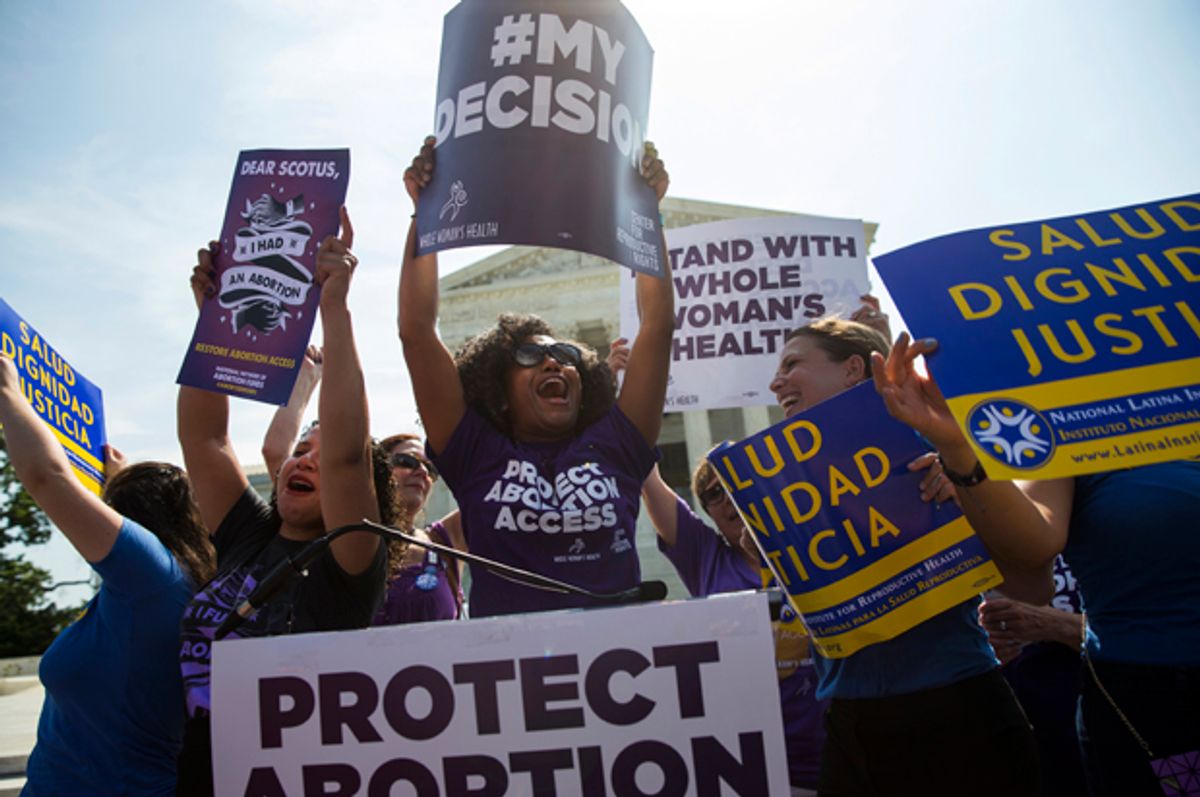One of the most immediate and ongoing negative reactions that Republicans had to the election of Barack Obama in 2008 was redoubling their efforts to end access to safe and legal abortion. That led to the adoption of hundreds of restrictions across multiple states, the largest single spate of anti-choice legislative activity in American history. Even though this was obviously an attack on women, a group that handed Obama his electoral victory, anti-choice politicians and activists preferred to pretend that they were taking away women's rights in order to protect women.
Anti-choice Republicans like former Gov. Rick Perry of Texas signed a series of laws to make abortion harder and more expensive to get, claiming that abortion was dangerous for women physically and mentally. This is flatly untrue — abortion is 14 times safer than childbirth and women who seek abortions are better off, in terms of mental health, if they are able to get them. But it sounded better for anti-abortion conservatives to claim that they were trying to help women than to admitting they were trying to take away women's rights.
Now, a new study commissioned by the Center for Reproductive Rights and Ibis Reproductive Health exposes the dishonesty of anti-choice politicians who claim they want to protect women and children. The report, titled "Evaluating Priorities," shows that there's an inverse correlation between a state's abortion restrictions and policies that actually support the health of women and children. Unsurprisingly, researchers also found that the more restrictions a state has on abortion, the poorer on average is that state's outcomes for women and children's health.
"This report makes clear that politicians in states with the most extreme record of attacking reproductive rights are also far less likely to support the kind of programs and policies that actually advance the health and well-being of families," Nancy Northup, the head of the Center for Reproductive Rights, said in a statement.
In a phone interview with Salon, Dr. Terri-Ann Thompson, the study's author, explained that abortion restrictions are not in themselves the source of the poorer health outcomes in these states. Instead, she said, this report is "a challenge to this narrative of enacting abortion restrictions in the guise of protecting women and children’s health."
“States that have the highest number of restrictions have dramatically fewer policies that would truly address the challenges women and their families meet," Thompson explained.
In other words, if these anti-choice politicians cared as much about women's health as they claim they do, they would devote more time and energy to policies that actually improve women's health, instead of passing laws that make it harder for women to get a safe and fairly routine medical procedure that nearly a million women get every year in the United States.
Here's a helpful map and chart demonstrating the gap:
The supportive policies that the researchers looked at — and that anti-choice politicians are loath to pass — were selected because they have demonstrably positive effects on public health. Many such policies, such as funding for Head Start or easier access to Medicaid, specifically help pregnant women who choose to go forward with their pregnancies. This lack of support for women who want to have babies in these abortion-averse states shows, yet again, that hostility to legal abortion doesn't translate into support for actual childbearing.
This is the second edition of this report. The first came out in 2014, and since then, even more laws have been passed restricting abortion. In 2016, however, this anti-choice strategy was dealt a serious blow when the Supreme Court rejected a Texas law severely restricting abortion access that was passed in the guise of "protecting" women. The law's requirements were medically unnecessary by any scientific measure, making it difficult for the justices to buy the bad-faith arguments about "women's health" offered by Texas legislators.
Unfortunately, that high-court defeat has done little to discourage conservative legislators from trying to pass even more restrictions on abortion, and they still try to portray abortion as an evil inflicted on hapless women, instead of as a positive and healthy choice women make for themselves with the help of their doctors. That's why it's critical to keep exposing the emptiness of the pro-woman rhetoric offered by Republican politicians, who balk at offering any government services or policies that might actually help women.
This is the political hamster wheel that pro-choice activists face: Anti-choicers keep on spinning outrageous lies and passing harmful policies, and pro-choicers have to keep debunking and suing to get those policies overturned. It's exhausting, but the only other option is to roll over and let anti-choicers dismantle women's access to health care access, while piously patting themselves on the back for "protecting" the women they've set out to persecute.




Shares